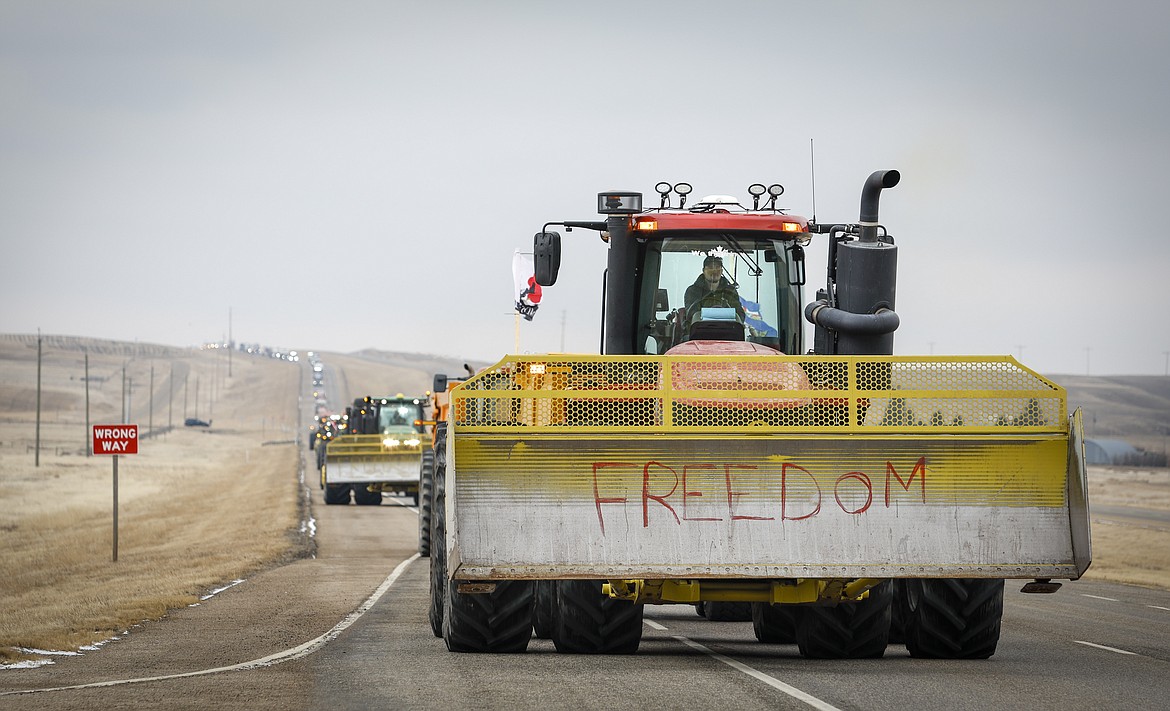'Freedom Convoy' occupation on Montana-Alberta border ends
Justin Franz Montana Free Press | Daily Inter-Lake | UPDATED 2 years, 11 months AGO
COUTTS, Alberta — The off-and-on blockade of the U.S.-Canada border north of Shelby appears to have ended 18 days after truckers protesting vaccine mandates blocked the highway with their vehicles. The end of the occupation at the Coutts, Alberta-Sweet Grass, Montana border came after more than a dozen people were arrested this week for allegedly planning violence against law enforcement, the Royal Canadian Mounted Police announced.
The protests — which began over vaccine mandates, but in recent days have become more about Prime Minister Justin Trudeau’s pandemic policies in general — have been garnering more attention this week from Canadian law enforcement north of the border and supportive Montanans south of it, some of whom have organized their own “Freedom Convoys.”
In March 2020, the U.S.-Canada border was closed to nonessential travel in an effort to slow the spread of COVID-19. People involved in essential activities, such as truckers, have generally been able to cross the border freely to do their jobs. Starting Jan. 15, however, Canada and the United States began requiring that truckers who cross the international boundary be fully vaccinated against COVID-19 or enter mandatory quarantine after crossing. In late January, a convoy of truckers gathered in British Columbia and headed east to Ottawa, where they began an occupation of the area surrounding Parliament Hill, disrupting life in the capital city. About the same time the Ottawa occupation began, a group of truckers and farmers converged on Highway 4 north of Coutts. Over the last two weeks, the group has generally halted travel and commerce between Montana and Alberta, though at times traffic has continued to flow over the international line.
Reaction to the protests among Canadian politicians has been mixed. Some conservative politicians have said they understand the protesters’ concerns, but that blocking border crossings and occupying the area around Parliament Hill goes too far. Trudeau, leader of the country’s Liberal Party, has said the protesters don’t represent the majority of Canadians. More than 80% of Canadians are vaccinated against COVID-19.
In Montana, the protests have found more support. Over the weekend, “Freedom Convoys” were organized in Columbia Falls and Eureka. The Eureka group drove north to the port of entry town of Roosville, where they met a group of Canadians who had driven down from Elko, British Columbia. State Sen. Mike Cuffe, R-Eureka, who has long been engaged with border issues related to the pandemic, spoke at the event and said that there were a few hundred supporters on either side of the border. Cuffe said the highway was not closed during Saturday’s event, which he described as “peaceful and positive.”
Cuffe said he believes Canada’s vaccination mandates and use of vaccine passports was unnecessary — especially, ,he said, since it appeared that the pandemic’s grip on normal life was waning.
“The government needs to listen to the people on this one,” he said.
Cuffe said that while he didn’t agree with some protesters’ methods, specifically the blockage of border crossings, he understood their motives.
“I hate to see commerce disrupted, but these truckers want to be heard and this is how they’re doing it,” he said.
In recent days, a number of Canadian provinces have ended their vaccine passport requirements for entry to public spaces. Among them is Alberta, which ended the requirement last week. British Columbia has said it will keep its vaccine passport requirement until at least the middle of March.
This week, Trudeau invoked the Emergencies Act, a 1988 law that gives the government broad powers to quell unrest during a “national emergency.” While the act has never before been used, a predecessor law, the War Measures Act, was used during both world wars and by Trudeau’s father, Prime Minister Pierre Trudeau, during the 1970 October Crisis, when Quebec separatists kidnapped a deputy premier and a British diplomat. The Emergencies Act allows law enforcement to prohibit travel in specific areas, including border crossings and Parliament Hill.
Before the act was invoked, law enforcement was able to clear and reopen the border between Windsor, Ontario, and Detroit, Michigan, a key gateway for trade between the U.S. and Canada. Then, early Monday, the RCMP arrested 13 individuals near Coutts after determining that a small group of protesters “have a willingness to use force against police if any attempts were made to disrupt the blockade.” RCMP later found three trailers full of weapons near the protest site, including guns, ammunition, and multiple sets of armor.
After the arrests, the organizers of the protests at Coutts decided to disband.
“Our message has been one of peace and to keep that message strong, we felt it was best to move on,” organizer Marco Van Huigenbos told Global News Edmonton.
Traffic began moving freely over the border at about noon on Tuesday, according to the RCMP.


